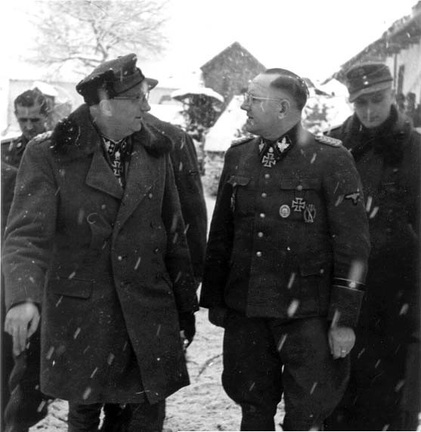awards
|
promotionsUnder construction.
|

Becker was born on 12 August 1902 in Neuruppin, Brandenburg.
In August 1920, he joined the Army and was assigned to the 5th Infantry Regiment at Angermunde.
In 1928, he was promoted to Stabsfeldwebel (warrant officer) in the 2nd Artillery Regiment at Szczecin.
At the end of his service in 1933, he joined the SS and met Wilhelm Bittrich and Hermann Prieß. According to his personnel file, he joined his service on 1 January 1934 and on 17 June 1934 was appointed adjutant of the 74th SS-Standarte.
In 1935, Becker was transferred to the SS Totenkopf association "Bavaria" as the commander of the recruit training company, and was responsible for the unit's transport.
In 1937, Becker was promoted to Sturmbannführer and in 1938 to Obersturmbannführer. Becker's unit was involved in the Anschluss of Austria and the occupation of the Sudetenland.
With the beginning of World War II, the 1st SS Totenkopf Infantry Regiment was upgraded into the new motorized division the 3rd SS Division Totenkopf. After the Battle of France, Becker was promoted to Standartenführer and given command of the 1st Battalion,1st Infantry Regiment Totenkopf. After the start of Operation Barbarossa, Becker assumed temporary command of the regiment. Even after being wounded, he remained in command and was officially appointed regimental commander in August 1941.
In September 1941, his command included a motorcycle battalion in a kampfgruppe during the battle of the Demyansk Pocket. For his performance during the battle, he was awarded the German Cross in gold.
With the conversion of the division to an armoured division in the autumn of 1942, Becker was made commander of the 6th SS Panzer Grenadier Regiment, which after the death of Theodor Eicke adopted his name as an honour title.
In August 1943, the regiment was ordered to capture the city of Nikotowka and heights 199 and 197. After heavy fighting, Becker decided to attack with his reserve battalion by advancing in front of a neighboring division which was not involved in the attack. He succeeded in seizing height 197 and rolling up the other two positions. Due to the success of the attack, the division advanced to Mertschik, destroying two Russian divisions, two armored brigades and one motorised brigade. For his actions in key situations, on 7 September 1943, he was awarded the Knight's Cross.
In October, he was given command of the division, until in March 1944, he assumed command of the 16th SS Panzer Grenadier Regiment, 16th SS Panzergrenadier Division Reichsführer-SS in Italy and was promoted to Oberführer.
After Hermann Prieß was given the task of forming the XIII. SS Army Corps, Becker was again in July 1944 given command of the 3rd SS Panzer Division Totenkopf.
In September 1944, he was awarded the Oak Leaves to the Knight's Cross for the division's actions in Romania and the fighting around Grodno. He was promoted to SS-Brigadeführer und Generalmajor der Waffen-SS. Becker was twice mentioned in the daily Wehrmachtbericht, on 1 and 2 January 1945.
In the next few weeks, the division was involved in fighting to the east of Warsaw and Modlin. In December, it was moved to Hungary for the battles around Budapest.
The division crossed the Danube River to Vienna, shortly before the surrender of German forces. The unit then attempted to surrender to the Americans, but the local U.S. commanders refused to accept the surrender and handed the men over to the Russians.
In captivity, Becker repeatedly looked out for his soldiers and became a problem for the guards. In November 1947, he was put on trial before a Soviet military court in Poltava and sentenced to 25 years forced labor, rebuilding destroyed villages. It is alleged that a fellow prisoner reported him for building a dud grenade in a brick wall, and in February 1953, he was shot for the supposed sabotage.
In August 1920, he joined the Army and was assigned to the 5th Infantry Regiment at Angermunde.
In 1928, he was promoted to Stabsfeldwebel (warrant officer) in the 2nd Artillery Regiment at Szczecin.
At the end of his service in 1933, he joined the SS and met Wilhelm Bittrich and Hermann Prieß. According to his personnel file, he joined his service on 1 January 1934 and on 17 June 1934 was appointed adjutant of the 74th SS-Standarte.
In 1935, Becker was transferred to the SS Totenkopf association "Bavaria" as the commander of the recruit training company, and was responsible for the unit's transport.
In 1937, Becker was promoted to Sturmbannführer and in 1938 to Obersturmbannführer. Becker's unit was involved in the Anschluss of Austria and the occupation of the Sudetenland.
With the beginning of World War II, the 1st SS Totenkopf Infantry Regiment was upgraded into the new motorized division the 3rd SS Division Totenkopf. After the Battle of France, Becker was promoted to Standartenführer and given command of the 1st Battalion,1st Infantry Regiment Totenkopf. After the start of Operation Barbarossa, Becker assumed temporary command of the regiment. Even after being wounded, he remained in command and was officially appointed regimental commander in August 1941.
In September 1941, his command included a motorcycle battalion in a kampfgruppe during the battle of the Demyansk Pocket. For his performance during the battle, he was awarded the German Cross in gold.
With the conversion of the division to an armoured division in the autumn of 1942, Becker was made commander of the 6th SS Panzer Grenadier Regiment, which after the death of Theodor Eicke adopted his name as an honour title.
In August 1943, the regiment was ordered to capture the city of Nikotowka and heights 199 and 197. After heavy fighting, Becker decided to attack with his reserve battalion by advancing in front of a neighboring division which was not involved in the attack. He succeeded in seizing height 197 and rolling up the other two positions. Due to the success of the attack, the division advanced to Mertschik, destroying two Russian divisions, two armored brigades and one motorised brigade. For his actions in key situations, on 7 September 1943, he was awarded the Knight's Cross.
In October, he was given command of the division, until in March 1944, he assumed command of the 16th SS Panzer Grenadier Regiment, 16th SS Panzergrenadier Division Reichsführer-SS in Italy and was promoted to Oberführer.
After Hermann Prieß was given the task of forming the XIII. SS Army Corps, Becker was again in July 1944 given command of the 3rd SS Panzer Division Totenkopf.
In September 1944, he was awarded the Oak Leaves to the Knight's Cross for the division's actions in Romania and the fighting around Grodno. He was promoted to SS-Brigadeführer und Generalmajor der Waffen-SS. Becker was twice mentioned in the daily Wehrmachtbericht, on 1 and 2 January 1945.
In the next few weeks, the division was involved in fighting to the east of Warsaw and Modlin. In December, it was moved to Hungary for the battles around Budapest.
The division crossed the Danube River to Vienna, shortly before the surrender of German forces. The unit then attempted to surrender to the Americans, but the local U.S. commanders refused to accept the surrender and handed the men over to the Russians.
In captivity, Becker repeatedly looked out for his soldiers and became a problem for the guards. In November 1947, he was put on trial before a Soviet military court in Poltava and sentenced to 25 years forced labor, rebuilding destroyed villages. It is alleged that a fellow prisoner reported him for building a dud grenade in a brick wall, and in February 1953, he was shot for the supposed sabotage.
DISCLAIMER: 2. Kompanie is a non-political organization We do not support naziism, or fascism. We are not associated with nor do we condone the actions of the Third Reich or the actual 3.SS Division.
